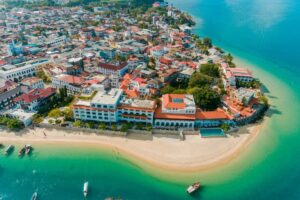He challenged Tanzanian envoys to better understand the country’s policies in order to use them in executing their duties.
Dr Mwinyi was addressing ambassadors gathering in the Isles for a week long meeting, which started on November 14.
“Your priorities should be aligned with goals set by the Union and Zanzibar governments,” he told envoys who will be addressed by President Samia Suluhu Hassan today.
Dr Mwinyi stressed on the need to diligently fulfill their responsibilities and understand the country’s image, policies and visions they carry through their representation abroad.
The visions and policies should be translated into action, stressed the Zanzibar President, noting that the move will enable colleagues in respective countries to easily receive and promote cooperation with respective countries, regions and international organisations.
He challenged the responsible ministry to continue building the capacity of staffs in order to increase their professionalism and efficiency.
Furthermore, Dr Mwinyi said envoys are obliged to build close cooperation with the private sector operating on both sides of the union in order to benefit with available opportunities.
The Zanzibar’s President said they should also abide by special directives issued on the Isles as stipulated in the Development Vision 2050 and the Development Plan 2021/26 documents, stressing on the need to strengthen the country’s economic diplomacy.
“You should continue working closely with both governments to meet objectives set especially on the need to secure better and reliable markets, attract investment, capital and tourists visiting the country,” he said.
He said Zanzibar is blessed with the ocean which is full of numerous resources, saying they are only challenged to ensure available wealth is utilized and sustained for the benefits of Tanzanians.
Dr Mwinyi said available resources should be used to uplift the life of the Zanzibaris, especially through implementation of the blue economy which comprises tourism, ports construction, fisheries, aquaculture, seaweeds farming, oil and gas exploration and transportation.
He said tourism was a rapidly growing sector in the Isles despite recent challenges, hinting that 61,388 tourists visited the Isles in August, 2022 as compared to 34,000 who toured the same period last year.
The minister for Foreign and East African Corporation, Dr Stergomena Tax said envoys have the role to oversee the country’s interests abroad, stressing that they have been directed to strengthen cooperation with the countries of representation.
She said the government would accelerate the Foreign Policy 2001 review in order to align it with the ongoing global changes.
The dean of Tanzanian ambassadors, Dr Asharose Migiro said among the topics discussed include the global trends so that the envoys can effectively implement the economic diplomacy policy.
The ambassadors were also taken through the opportunities available in Zanzibar and its Blue Economy plan, she said.
“We promise to continue with our work to represent our country and strengthen relationships with other countries by following the priorities of the nation and bringing more investors,” she said.
Dr Mwinyi said that the government has taken deliberate measures to improve the business and investment environment by cutting to secure their investment permit.
He said, an investor with complete documents can complete all the procedures within 24 hours and gets the certificate.
Dr Mwinyi said the government has improved the airports and ports to simplify transportation in Zanzibar.
“If you return to your work stations, explain clearly the improvements that have been made in order to encourage traders and investors to come to Zanzibar,” he said.
Agricultural activities in Zanzibar include growing cloves, spices and seaweed, which generate foreign currencies.
“Support the government efforts in finding new markets for processed products,” he said, adding that the mission is to ensure that more processing industries are built in Zanzibar to avoid exporting raw products.
Share this news
This Year’s Most Read News Stories

Zanzibar liquor importers face fresh hurdle despite court order
The liquor shortage in Zanzibar is far from over, even after a court order granted relief to the three importers.Continue Reading

Britam half-year net profit hits Sh2bn on higher investment income

Insurer and financial services provider Britam posted a 22.5 percent jump in net earnings for the half-year ended June 2024, to Sh2 billion, buoyed by increased investment income.
The rise in half-year net profit from Sh1.64 billion posted in a similar period last year came on the back of net investment income rising 2.5 times to Sh13.27 billion from Sh5.3 billion.
“We are confident in the growth and performance trend that Britam has achieved, supported by its subsidiaries in Kenya and the region. Our business is expanding its revenue base while effectively managing costs,” Britam Chief Executive Officer Tom Gitogo said.
“Our customer-centric approach is fueling growth in our customer base and product uptake, particularly through micro-insurance, partnerships, and digital channels.”
The investment income growth was fueled by interest and dividend income rising 34 percent to Sh9.1 billion, which the insurer attributed to growth in revenue and the gains from the realignment of the group’s investment portfolio.
Britam also booked a Sh3.79 billion gain on financial assets at a fair value, compared with a Sh1.8 billion loss posted in a similar period last year.
The increased investment income helped offset the 12.7 percent decline in net insurance service result to Sh2.13 billion in the wake of claims paid out rising at a faster pace than that of premiums received.
Britam said insurance revenue, which is money from written premiums, increased to Sh17.8 billion from Sh16.6 billion, primarily driven by growth in the Kenya insurance business and regional general insurance businesses, which contributed 30 percent of the revenue.
The group has a presence in seven countries in Africa namely Kenya, Uganda, Tanzania, Rwanda, South Sudan, Mozambique, and Malawi.
Britam’s insurance service expense hit Sh13.6 billion from Sh11.3 billion, while net insurance finance expenses rose 2.6 times to Sh12.3 billion during the same period.
“Net insurance finance expenses increased mainly due to growth in interest cost for the deposit administration business driven by better investment performance. This has also been impacted by a decline in the yield curve, which has led to an increase in the insurance contract liabilities. The increase has been offset by a matching increase in fair value gain on assets,” said Britam.
Britam’s growth in profit is in line with that of other Nairobi Securities Exchange-listed insurers, which have seen a rise in profits.
Jubilee Holdings net profit in the six months increased by 22.7 percent to Sh2.5 billion on increased income from insurance, helping the insurer maintain Sh2 per share interim dividend.
CIC Insurance Group posted a 0.64 percent rise in net profit to Sh709.99 million in the same period as net earnings of Liberty Kenya nearly tripled to Sh632 million from Sh213 million, while Sanlam Kenya emerged from a loss to post a Sh282.2 million net profit.

Zanzibar tourism investors alarmed by new mandatory insurance fee
Tourism investors in Zanzibar have voiced their concerns over the introduction of mandatory travel insurance, cautioning about its potential negative impact on the industry.Continue Reading











